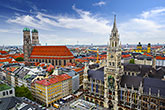HD Hyundai to develop fuel cell technology for cruise ships
Published by Ellie Brosnan,
Editorial Assistant
Global Hydrogen Review,
SOFC is a high-efficiency fuel cell that generates electricity by reacting hydrogen – extracted from sources such as natural gas or ammonia – with oxygen. Since it produces electricity without combustion, it significantly reduces carbon and pollutant emissions. Compared to conventional engine-based power generation systems, SOFC offers superior efficiency, achieving both environmental sustainability and economic viability. It produces a low level of noise and vibration while providing high power generation efficiency, making it especially suitable for cruise ships that require large amounts of electricity.
HD Hyundai plans to secure global competitiveness by developing SOFC technology applicable to cruise ships, with a focus on the European market – where environmental regulations are stringent and demand for such vessels is high.
The market outlook is also promising. According to market research firm Grand View Research, the global SOFC market is expected to grow at a compound annual growth rate (CAGR) of 40.7% through 2030, reaching approximately US$7.12 billion, driven by increasing demand and investment in clean energy.
As a first step, HD Korea Shipbuilding & Offshore Engineering and the HD Europe Research & Development Center will establish safety design standards for applying SOFC systems to cruise ships over an eight-month period from June 2025 to February 2026. HD Hydrogen, an affiliate of HD Korea Shipbuilding & Offshore Engineering specialising in hydrogen fuel cell technology, will analyse the performance of its proprietary SOFC systems under various operating conditions based on its core technical data.
In addition, HD Hyundai will develop technologies to recover and reuse waste heat generated by SOFC systems, which operate at high temperatures ranging from 600 - 1000°C. The company also plans to explore solutions to partially reduce carbon emissions from SOFC systems by leveraging carbon capture and storage (CCS) technologies.
As part of the project, DNV will support regulatory compliance and contribute to overall safety from the initial design onward. TUI Cruises will provide cruise ship specific data relevant to SOFC application, along with installation requirements and operational specifications necessary for actual deployment.
A representative from HD Hyundai stated: “This international JDP marks a significant milestone in demonstrating HD Hyundai’s decarbonisation technology for ships in the European market. We hope to lead the maritime decarbonisation initiative through our low-carbon, high-efficiency fuel cell technology.”
Meanwhile, HD Hyundai established HD Hydrogen in 2025 as part of its effort to enter the hydrogen fuel cell market. The company is currently collaborating with various global shipping companies to expand the application of SOFC systems across multiple types of vessels.
Read the article online at: https://www.globalhydrogenreview.com/hydrogen/19062025/hd-hyundai-to-develop-fuel-cell-technology-for-cruise-ships/
You might also like
BMV invests €54 million in hydrogen technology centre
The Federal Ministry of Transport (BMV) has invested €54 million in a new hydrogen innovation and technology centre in Pfeffenhausen, Bavaria, Germany.

